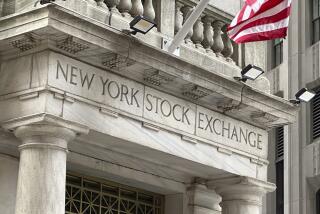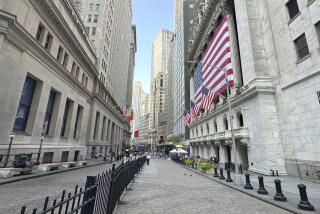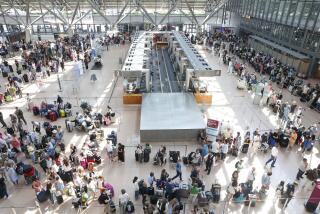NYSE, Nasdaq Stay Closed
NEW YORK — U.S. stock markets will stay closed until at least Monday, making for the longest break in trading since before World War II.
Communications and power problems in terror-struck lower Manhattan, plus concerns for the safety of financial workers and the need to let rescue efforts proceed unhampered, outweighed the desire to get the world’s most important equity markets back in action, officials said.
“No desire to resume trading will ever take precedence to the desire to find every possible human being who is buried in that mass” of wreckage, Richard Grasso, chairman of the New York Stock Exchange, said Thursday afternoon at a news conference.
Some market professionals welcomed the additional time, saying it would give Wall Street workers more time to adjust psychologically to the horror that began Tuesday morning, when hijacked airliners destroyed the twin 110-story towers of the World Trade Center just blocks from the NYSE.
Then there is the sheer logistical problem of getting an estimated 75,000 to 125,000 financial workers back to Wall Street, not to mention lighting their offices, powering their computers and feeding them.
The difficulties seemed daunting, based on a walk Thursday morning through the city’s financial heart.
“I don’t know how they’re going to do it,” said Kevin Brown, who works for the real estate firm that manages 30 Wall Street, near the NYSE.
Only a few of the lawyers and financial pros who work in his building have made it past police barricades to get to work. And those few came only because “they were going crazy at home,” he said in an interview on the sidewalk outside the building.
No subway stations within half a mile of the NYSE were open.
On a balcony of the NYSE’s grand facade facing Broad Street, a masked worker vacuumed soot from the base of the building’s familiar columns.
Acrid dust from the World Trade Center collapse still coated the streets and hung in the air. Few of those on foot in the area Thursday were without cotton face masks, kerchiefs or more elaborate gas masks.
Water poured from open hydrants down many streets, and wrist-thick rubber-coated power cables snaked along many sidewalks.
On the streets farther west, toward the rubble of the Trade Center, the sidewalks were littered with scraps of paper from the demolished offices--a trade slip indicating the purchase of some corporate bonds; a sheet, blackened at the edges, marked “Kidder Peabody & Co., Cash Disbursements Journal.” That firm was liquidated in 1994.
Still, New York City officials promised that when Wall Street is ready, the city will be.
“The city has told us that when we want to reopen, they will make sure that the ways are open to get people in,” NYSE spokesman Robert Zito said.
Emblematic of the obstacles regulators and market officials face is that the meeting they called Thursday afternoon to announce the postponement had to be relocated from one midtown brokerage headquarters to another because of a bomb threat, which proved false.
Grasso was joined at the news conference by Hardwick Simmons, chairman of the Nasdaq Stock Market, and Harvey Pitt, chairman of the Securities and Exchange Commission. The group finally convened at CS First Boston on Madison Avenue, after being diverted from the Park Avenue quarters of Bear Stearns Cos.
The news conference followed meetings among those officials and the heads of many of Wall Street’s top securities firms. Simmons said the decision to forgo trading today was unanimous.
“Buying a little time is a good idea,” said Arthur Micheletti, chief investment strategist at Bailard Biehl & Kaiser in San Mateo, Calif.
“The last thing you want to do is open trading and have a bunch of failures that force you to shut it down again and undermine confidence even further,” he said.
One of the major stumbling blocks to resuming trading is the hobbling of two key switching stations in the Wall Street area operated by Verizon Communications Inc. Verizon said damaged equipment and an uncertain power supply have made it impossible to guarantee that the NYSE will get the lines needed to handle the huge volume of voice and data traffic generated by stock trading.
The brokerage houses will test their communications linkages with the markets Saturday morning, Grasso said. Any serious faults could cause the Monday opening to be reconsidered, he said.
Several securities firms intend to operate from backup disaster sites across Manhattan’s rivers in Brooklyn and New Jersey.
Nasdaq said the possible collapse of its New York headquarters near the World Trade Center won’t affect its opening because its computer operations are in Connecticut.
CNBC, the financial-news cable TV channel, said that in an unprecedented move, it will turn over its airwaves to the SEC, NYSE, Nasdaq and the American Stock Exchange for use as an information conduit from 1 to 5 p.m. PDT Sunday.
The regulators and exchanges will use the time to inform the financial community about transportation logistics and security and health precautions, CNBC said.
Paul Capelli, CNBC vice president for public relations, said he did not consider it a conflict for the channel to turn over air time to institutions that it covers.
“I think everybody is stepping back now and saying, ‘What can we do to contribute,’ ” he said.
More to Read
Inside the business of entertainment
The Wide Shot brings you news, analysis and insights on everything from streaming wars to production — and what it all means for the future.
You may occasionally receive promotional content from the Los Angeles Times.







